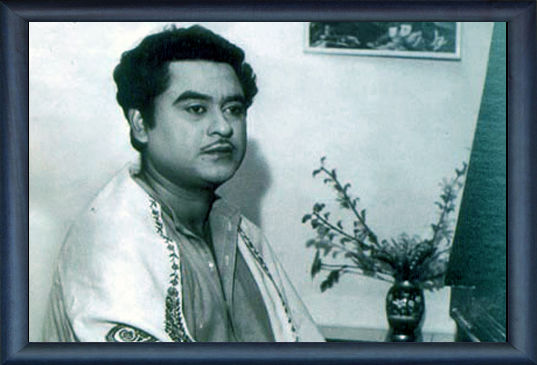What do you call a man who can sing and dance, act and mimic, write and compose, make you laugh and cry all at one time? How do you define a person who lives by defying norms? How do you quantify a genius whose talent is immeasurable? Multi-faced, versatile, eccentric, sensitive, prankster. There has been only one such a man in Hindi filmdom, Kishore Kumar.
Kishore Da was born on August 4, 1929, in Khandwa, Madhya Pradesh as Aabhas Kumar Ganguly. Kishore Kumar's father Kunjalal Ganguly, a lawyer by profession, was a modest man. Kishore's mother Gauri Devi, hailed from a wealthy family. Of the four children,
Ashok Kumar was the eldest, born on 13 October 1911 and was twenty years older than Kishore . He was followed by a daughter, Sati Devi,who was about 15 years older to Kishore. The next was a boy, Anoop Kumar was about 5 years older than Kishore, who was the youngest of all. Since his childhood Kishore nurtured dreams of becoming a singer and following the footsteps of his idol
K. L. Saigal. He visited his by then famous star brother
Ashok Kumar, in Mumbai frequently, in the hope that he would introduce him to
K. L. Saigal. But destiny willed otherwise. He was forced into acting and hated every moment of it.
In an industry, where comedy was seen as a filler or diversion from the main plot, there emerged in the form of Kishore, a hero who made comic acting an evolved art. Laughing, singing and dancing, Kishore was the complete comic hero, comparable to the likes of Bob Hope and Dany Kaye. And his unconventional looks and personality added to the fun that audiences had when watching him. Even while playing second fiddle to the hero, Kishore added an extra zing to the film.
The young Kishore's real ambition was to become a playback singer and which became true, when, music director
Khemchand Prakash called him to lend his voice for Dev Anand for the film Ziddi in 1948, the song was 'Marne Ki Duayen Kyon Maangoon..'. It was then that he met
Lata Mangeshkar, an encounter as amusing and as strange as everything else is about Kishore Kumar. In his own words, in a rare interview with Lata he saya, "We happened to be travelling in the same local train. You got off and i got off. You got into a tonga, so did i. Both of us reached Bombay Talkies Studios. And you were convinced that i was following you."
Kishore was unstinting in crediting his popularity to the Burmans- father and son. It was
S. D. Burman who made Kishore, the superstar singer of the seventies, when he chose him to sing 'Roop Tera Mastana..' for Rajesh Khanna in the superhit Aradhana.
S. D. Burman did more than just make Kishore Kumar a superstar singer. He helped him out when his marriage to Ruma Devi caused a split in the family, by makinghim sing, 'Qusoor Aapka Huzoor Aapka..' in Bahaar and the song went on to become a hit. Eventually that was the first song of Kishore with Dada Burman. Sachin Da made him the vopice of Dev Anand much before Rajesh Khanna came on the screen. In Baazi, Paying Guest, Munim Ji, Guide, Teen Deviyan, Jewel Thief etc. under
S. D. Burman's expert hands, Kishore's talent was honed and fine tuned.
Another composer who placed implacable faith in Kishore was Sachin Da's son,
R. D. Burman. The lack of basic training in music, never hampered Kishore's intuitive feel and enormous talent for music.
R. D. Burman saw Kishore's talent for mimicry to be the singer's greatest advantage. His ability to mimic combined with his voice quality gave him tremendous speed and power.
R. D. Burman found these qualities absymaly lacking in newer singers who blindly aped the timber of Kishore's voice. Kishore's ability to modulate his voice to suit the personality of the hero, and the ethos of the situation, was what made him a star. He was as much the voice of the dapper Dev, the aorable Rajesh as well as the aggressive, angry young man Amitabh Bachchan.
Kishore Kumar's eccentricities were probably his way of defending himself from a cruel, confused world. Though laughter was his leitmotif, Kishore Kumar was buffeted on the seas of life. In private, his search for love and acceptance, made and broke his marriages. He defied his family to marry Ruma Devi and ironically never found time to spend with his wife and young son. He was entranced by the beautiful Madhubala, but illness doomed their union. His brief dalliance with the young Yogita Bali was another pained cry for companionship. And when he finally found true love with Leena Chandravarkar, cruel fate intervened and before long took him away forever.
His sudden death came as shock to everyone. He recorded his last song on october 12, 1987, a day before he died.
Lata Mangeshkar's fond and fitting tribute best describes this great personality....."He was a sampoorna kalakar (the complete artist). He knew everthing. I call him India's Danny Kaye. Producer, Actor, Singer, Director, Lyricist, Composer.....".

